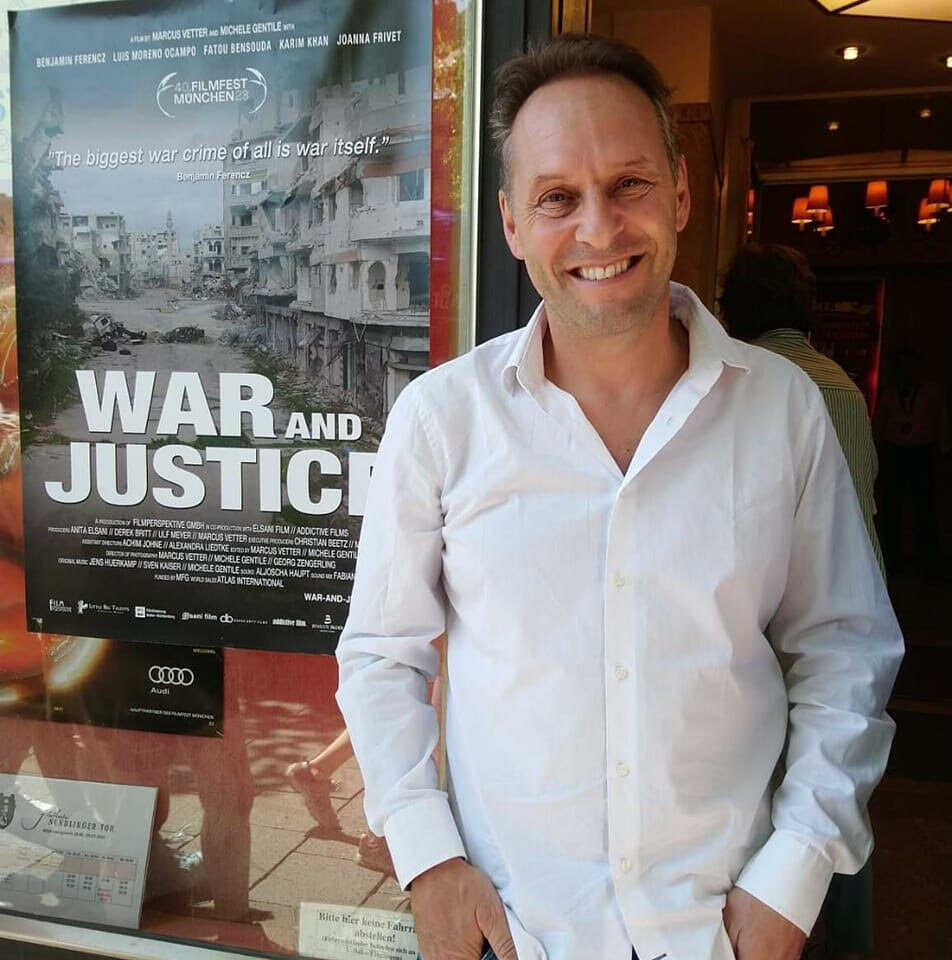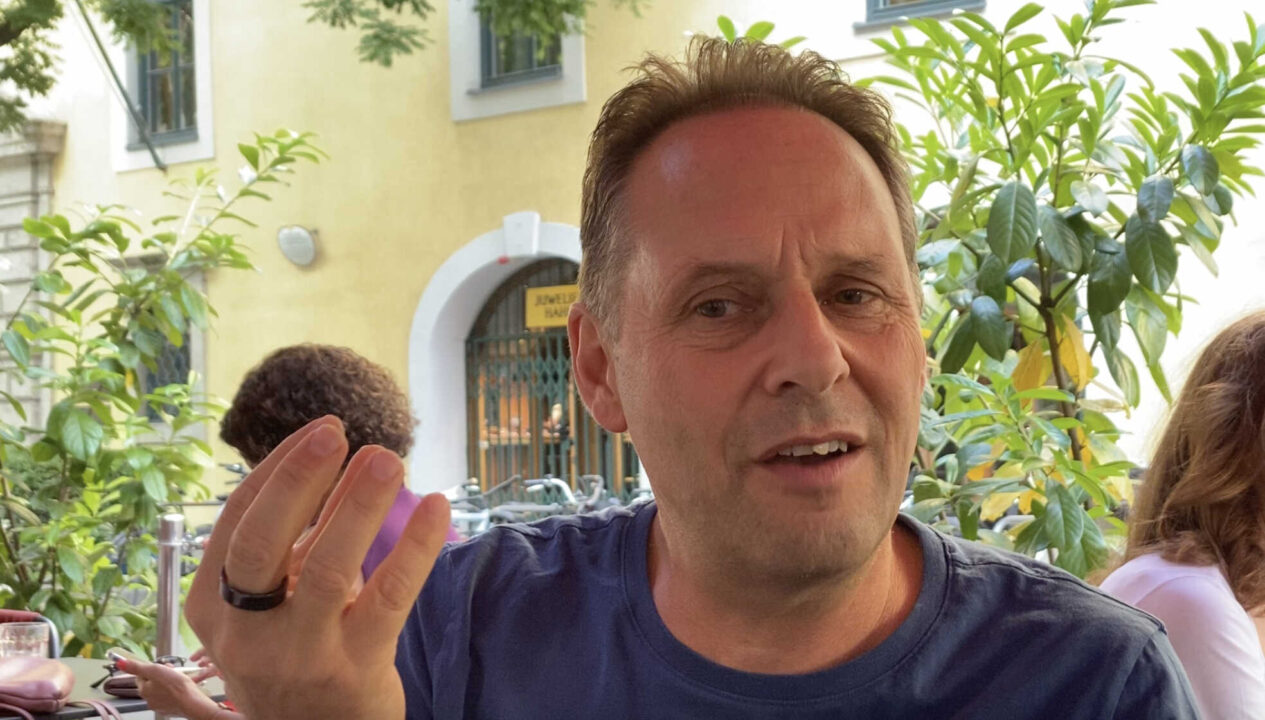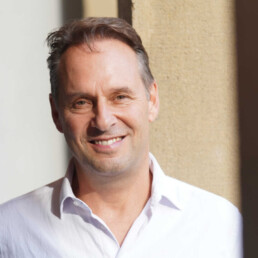Can war crimes truly be prevented, or is the essence of war itself the greatest atrocity? This question is suggested by Ben Ferencz, the esteemed former prosecutor of the Nuremberg Trials. It’s also thoroughly investigated by director Marcus Teller in his powerful new documentary, War and Justice.
Through the lens of his documentary, acclaimed director Marcus Teller explores the 25-year history of the International Criminal Court (ICC) and its relentless pursuit to eradicate the gravest crimes against humanity. In our exclusive interview, the visionary filmmaker discusses the intricate journey of creating this thought-provoking documentary and the insights it unveils about justice in times of conflict.
It’s a pleasure to meet you, Marcus. How did you decide to make this documentary about the International Criminal Court (ICC)? What drew you to its 25-year history?
In 2008 I was doing a film, Heart of Jenin, about the story of the Palestinian father Ismael Khatib whose son was shot by an Israeli soldier in the Palestinian city of Jenin. Instead of seeking revenge, Ismael decided to donate his son’s organs to Israeli children as a sign of peace. Such actions instead have inspired other people to do the same. Luis Moreno Ocampo, the first prosecutor of the ICC, saw the film at the Cinema For Peace gala in Berlin. He was so inspired by Ismael’s bold act of humanity that he called me to visit him in The Hague. He had just received a Palestinian delegation who requested the ICC to investigate possible war crimes committed by Israel in the Gaza war of 2008/2009. But as Palestine back then was not yet accepted as a state and therefore never could ratify the ICC, he had to refer the case first to the United Nations Assembly who eventually decided to consider Palestine as an observer state. With that, Palestine later ratified the ICC and became a member state of the court.
That is why today the ICC has jurisdiction over crimes committed in Palestine even though Israel has never accepted the ICC, and this is why arrest warrants are looming over Benjamin Netanyahu for having committed possible war crimes in the ongoing Gaza war, as well as some Hamas leaders of ordering the heinous attacks on October 7. An act of humanity is so much stronger, and reconciliation can lead to so much more then vengeance and violence. War can be replaced by justice. This is what inspired me most in the making of the film and this has become the main theme of the documentary.
Ben Ferencz argues that war itself is the greatest war crime. How does your documentary address this perspective?
What Ben Ferencz is referring to is the very fact that in all wars, soldiers will carry out atrocities. This is the nature of wars. Civilians cannot be protected, as much as we wish for it. This why Ben, who was the youngest prosecutor at the Nuremberg trial, has spent his whole life advocating that we have to avoid wars by all means. The documentary tells the story of the ICC’s mission to make heads of state accountable who command or order war crimes so that they don’t get away with impunity. In 2017, the Rome Statute is amended by the mother of all war crimes: starting a war of aggression.
Unfortunately, the US has put its veto so that not only the attacked state needs to be a state party of the ICC, but also the attacking state for the ICC to have jurisdiction and being able to intervene. Powerful nations such as the USA, Russia, India and China have never accepted the ICC’s belief that they are above the law and can not be held accountable if they commit crimes of aggression, as it is the case with Russia today, but also with the USA when they launched a war on Iraq in 2003.
What were some of the most compelling stories or cases you encountered while researching War and Justice, and why did they stand out?
Most compelling for me was what happened in Abu Ghraib when US soldiers were filming their tortures in an Iraq prison. Because these tortures were used by ISIS as one of their main arguments to recruit people to join them. “Vengeance begets vengeance,” as Ben Ferencz says. This stands in total contrary to the story of why I actually ended up making this film. This story of the Palestinian father Ismael Khatib has inspired so many people to do the same. For example, I decided to refurbish an old cinema in Jenin and hundreds of volunteers all around the world did the same. The story was finally told in the documentary Cinema Jenin: The Story of a Dream.
Then, the act of humanity by an Israeli woman, Yael Armanet, whose husband was killed in a suicide attack in Haifa, inspired me. She decided to visit the suicide bombers family in Jenin, which is also told in a heart breaking documentary of two young directors with the title After the Silence. So yes, vengeance and violence begets nothing else other then vengeance and violence. Those who overcome those feelings are truly moving the world. This was the real take away for me at the course of making the film.

How did you navigate the balance between telling the ICC’s institutional history and highlighting the personal stories of those affected by war crimes?
The film’s main challenge was to introduce a dry and very complex subject matter to a layman’s audience. Another challenge was to show what happens to the victims of war without exposing them. For example, the scene of a young, maybe 12 year old boy being abducted to become a child soldier and being beaten up by some soldiers on the back of a truck. This scene is very cruel and hard to watch. A few minutes later, we see a witness in the court being interrogated by the prosecution about him being abducted and beaten up. By listening to his words and his description of what happened to him, our imagination cannot grasp what really happens at war. When this young boy talks about the very fact that they broke his friend’s arms as a punishment, we cannot possibly understand what it really means. But if we see the scene on the truck, it is so unimaginably strong that we hardly can watch it.
This was the balance we needed to work out so that the audience can understand what is at stake, but is not overwhelmed. We tend to look away because we cannot bear it. We read articles about the newest killer drones, F16 fighter jets, about tanks destroying the enemy, and we start to loose our empathy with those being exposed to the war. The film brings these scenes of atrocities in the mildest way possible to the audience, as a reminder why we should not be indifferent. It matters and it could be our children who have to fight the next war.
What impact do you hope War and Justice will have on viewers’ understanding of international justice and the prevention of war crimes?
War and Justice is clearly the most important film I have ever directed. There are very personal films, like the film about my Turkish father who I met the first time when I was 37 – My Father, The Turk – or a film about cruelty of hunger. But War and Justice is so important because it presents the audience alternative arguments towards war in a time when war is chosen by the world as a mean of resolving conflicts. A lot of people have made their mind and are now convinced that there may be no alternative to it. That we need to deliver weapons, that we need to be in solidarity with Ukraine, or with Israel or with Palestine, and that we need to finish it. That the time for peace and reconciliation has run out.
Herman Goering, one if the defendants at the Nuremberg trial, was asked why the Germans could possibly opt for this total war. And he said: “It’s very easy. You just had to tell them that we were attacked and that we have to preempt it. All the remaining pacifists have to be denounced as traitors.” He said it would work the same way in any country and at any moment in the future. Of course there are reasonable arguments for war this time. The appeasement policy with Hitler, for example. That we should never have let Hitler go so far and we should stop Russia before conquering other countries as well. But are we really sure that Russia would do it? And can we really compare the current situation with Hitler’s psychopathic war of aggression? The film makes you rethink your stance towards war and is so important in these times…
Were there any moments during filming or production that particularly challenged or surprised you positively or negatively?
A very important moment in the documentary is the scene with the taxi driver when he drives Ocampo to his hotel in The Hague. He asks a very interesting question exposing some of the flaws of the ICC, for example, why the leaders of the mighty states never will be prosecuted. In my eyes this court will only make a real difference if it is perceived as a neutral and just court that tries not be influenced by politics. We should never forget that 2/3 of the member states of the ICC are from the global south, so the conditions are there for the ICC to be a court of all nations.
Karim Khan, the current prosecutor’s decision to ask for arrest warrants for Hamas leaders and an Israeli Head of State and his Defense Minister, were very bold decisions that has sent a message to the world that he does not shy away to stay neutral even though the US has threatened him to retaliate even personally against everybody from the ICC involved in those decisions.
How do you see the role of documentaries like yours in influencing public opinion and policy regarding international criminal justice and human rights?
It’s hard work. You have to work on a film until you are really sure that the audience is truly emotionally impacted by its story arc and the message of the film. But then the real journey only begins. With the anti-war message the film has, it is a pretty hard undertaking in these days. For some important festivals, screening platforms and TV stations the message of the film is way too controversial. It is going too much against the tide. This makes it very challengeable for us. We are now working with the Dresdner Sinfonics, one of the most prestigious orchestras in the world, and they want to play the music score of not only the film War and Justice, but also my other three films Heart of Jenin, Cinema Jenin, and After the Silence, live, and together with other symphony orchestras and musicians from the different conflict regions Palestine, Israel, Ukraine, Russia, Taiwan, China and Iran. A good number of orchestras already have agreed to cooperate.
So, under the title “Messages of Hope,” we want to spread hope with these stories of normal people that have tried to break the viscous circle of violence instead of seeking revenge. War and Justice will be the last film of the series and after the premier in an important opera house in Germany we will travel with it to symphony orchestras all over the world addressing a totally new audience interested in classical contemporary music. A world class Armenian composer has already agreed to compose the four overtures and re-arrange our existing film scores for these sinfonie orchestras. Stay tuned!
Looking forward, what are the most pressing issues facing the ICC and the pursuit of global justice, and how can documentaries and media address these issues?
The ICC’s biggest challenge now is to keep working in making this court to be perceived as a neutral and independent court. Each chief prosecutor was different and has influenced the identity of the court. Luis Moreno Ocampo, Fatou Bensouda and now Karim Khan. The good thing is they will hand over to the next. So, the ICC is permanently evolving. I hope the film, by having filmed for such a long time period of 13 years and by having given a glimpse of each of the three prosecutors, will help to shed a light at this institution and to make it also for a layman accessible.
Let’s get to know you better! Where are you from and where do you currently reside?
I am from a small German student town called Tübingen, but currently also living in Duisburg next to Cologne. I work as a commissioning editor for a German TV station being responsible for a slot called “Junger Dokumentarfilm” for first-time filmmakers. We work together with a prestigious film shool nearby Stuttgart called Filmakademie Baden Württemberg. So while I love directing and producing films, I also love to teach and to be involved with he next generation of filmmakers.

What are your favorite films, who are your filmmaking idols, and dream collaborators?
My favourite film festival is IDFA in Amsterdam. I love to hang out there in autumn and watch these incredible documentaries that directors from all around the world are giving us as a present. They risk their lives for us, and they are embedding themselves in situations and giving us thereby visual and emotional access to a world that we as an audience could never attend. This for me is a true beauty, but unfortunately only few people know about it and can therefore enrich themselves with it.
So, to answer your question, instead of singling out one idol, I am embracing all these filmmakers who are committing themselves to their vision of true storytelling under often precarious conditions.
What is one thing you’ve learned as a filmmaker that you think other filmmakers would benefit from knowing in starting their careers?
Try to overcome your own prejudices and be open towards your story and your journey. We often need to prove to TV stations and film funds with extensive treatments and exposés the quality of our stories. Even though I understand it and think that it is good and important to write your story down for potential commissioning editors, producers , investors and yourself, I really think you should never blindly follow through. If you stay open you will find your story line.
With War and Justice, I only understood at a very late stage that my point was actually your first question you asked me in this interview: That war itself may be the biggest war crime of all.
What is one message that you would like to share with audiences about your work, your general outlook on life, that you are interested in further showcasing in your films?
Never lose hope, and trust in people. Trust in your audience, trust in your protagonist, but most importantly, trust in the people that you are working with. If this trust would be abused one time, never mind. You will be rewarded by all the others who you have trusted in a million times.

